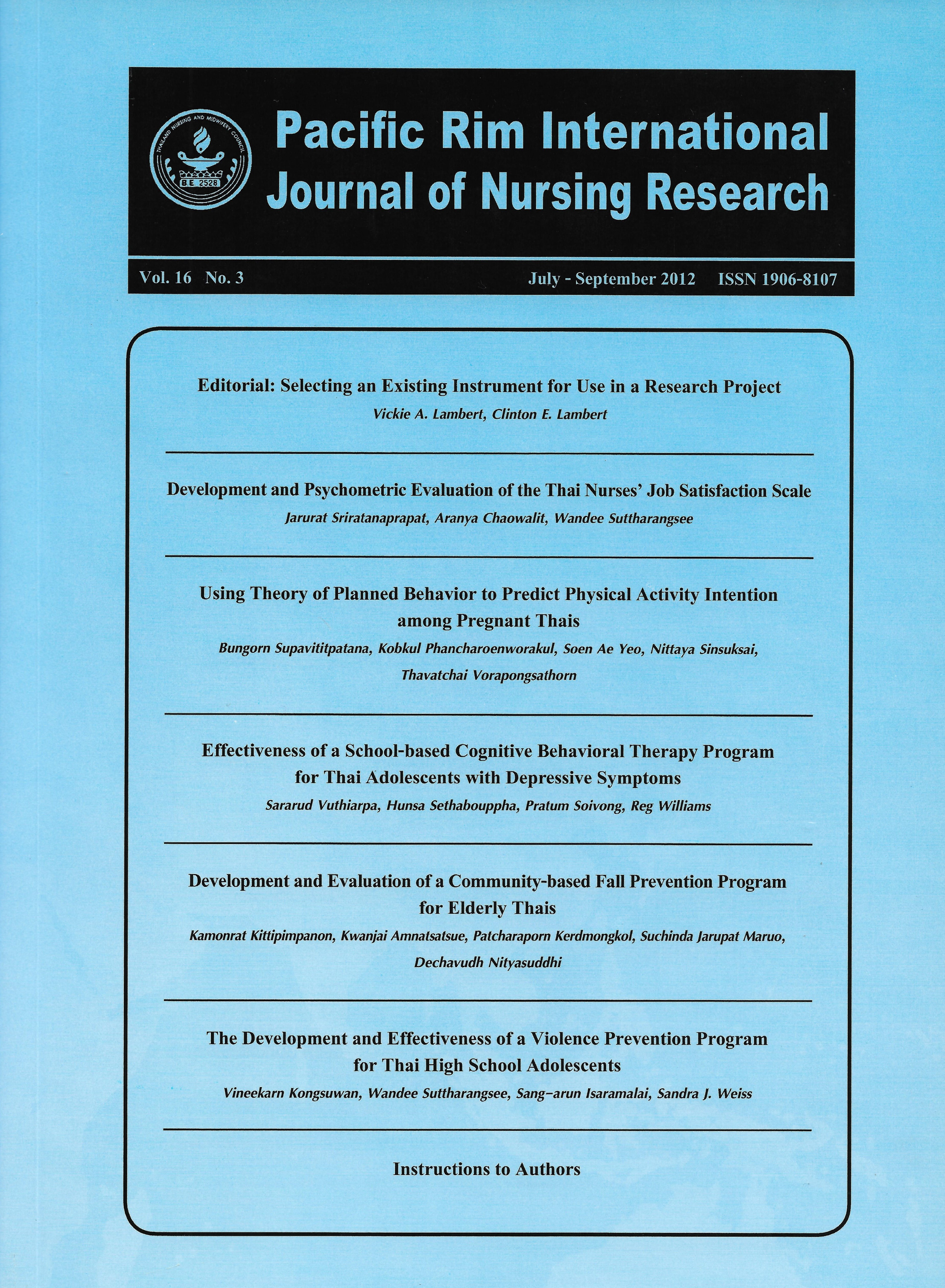Using Theory of Planned Behavior to Predict Physical Activity Intention among Pregnant Thais
Keywords:
สตรีตั้งครรภ์, การทำ, กิจกรรมทางกาย, ความตั้งใจ, ทฤษฎีพฤติกรรมที่มีการวางแผน, Pregnant Thais, Physical activity, Intention, Theory of Planned BehaviorAbstract
บทคัดย่อ
การวิจัยเชิงบรรยายครั้งนี้มีวัตถุประสงค์เพื่อศึกษาปัจจัยที่มีอิทธิพลทำนายความตั้งใจที่จะทำกิจกรรมทางกายของสตรีที่อยู่ในระยะไตรมาสที่สองของการตั้งครรภ์โดยใช้ทฤษฎีพฤติกรรมที่มีการวางแผน (The Theory of Planned Behavior) เป็นกรอบแนวคิดในการศึกษาวิเคราะห์อิทธิพลโดยหาความสัมพันธ์เชิงสาเหตุของอิทธิพลโดยอ้อมและโดยตรงระหว่างตัวแปร ความเชื่อเกี่ยวกับการทำกิจกรรมทางกาย ความเชื่อในบรรทัดฐานของบุคคลสำคัญ ความเชื่อในความสามารถควบคุมให้ทำพฤติกรรม ทัศนคติบรรทัดฐานของบุคคลสำคัญ การรับรู้ความสามารถในการควบคุมพฤติกรรม (Perceived BehavioralControl) และความตั้งใจที่จะทำกิจกรรมทางกาย (Intention) ในระยะไตรมาสที่สองของการตั้งครรภ์กลุ่มตัวอย่างที่ทำการศึกษาได้แก่ สตรีตั้งครรภ์ที่อยู่ในระยะไตรมาสที่สองที่มาฝากครรภ์ที่โรงพยาบาลมหาราชนครเชียงใหม่และโรงพยาบาลส่งเสริมสุขภาพเชียงใหม่ จำนวน 272 ราย ผู้วิจัยทำการสุ่มตัวอย่างด้วยวิธีการสุ่มแบบเจาะจงเครื่องมือที่ใช้ในการวิจัยได้แก่ แบบสอบถามข้อมูลส่วนบุคคล แบบวัดทัศนคติ แบบวัดบรรทัดฐานของบุคคลสำคัญ แบบวัดการรับรู้ความสามารถในการควบคุมพฤติกรรมและแบบวัดความตั้งใจที่จะทำกิจกรรมทางกาย
ผลการศึกษาพบว่า โมเดลที่เสนอมีความสอดคล้องกับข้อมูลเชิงประจักษ์ และสนับสนุนทฤษฎีพฤติกรรมที่มีการวางแผนกล่าวคือ ความเชื่อเกี่ยวกับการทำกิจกรรมทางกายมีอิทธิพลทางบวกต่อทัศนคติ ความเชื่อในบรรทัดฐานของบุคคลสำคัญมีอิทธิพลทางบวกต่อบรรทัดฐานของบุคคลสำคัญและความเชื่อในความสามารถควบคุมให้ทำพฤติกรรมมีอิทธิพลทางบวกต่อการรับรู้ความสามารถในการควบคมุ พฤตกิ รรม สำหรบั ปจั จยั ทมี่ อี ทิ ธพิ ลโดยออ้ มทางบวกตอ่ ความตงั้ ใจทจี่ ะทำกจิ กรรมทางกายได้แก่ ความเชื่อเกี่ยวกับการทำกิจกรรมทางกาย ความเชื่อในบรรทัดฐานของบุคคลสำคัญ และความเชื่อในความสามารถควบคุมให้ทำพฤติกรรม สำหรับปัจจัยที่มีอิทธิพลโดยตรงทางบวกต่อความตั้งใจที่จะทำกิจกรรมทางกายได้แก่ ทัศนคติ บรรทัดฐานของบุคคลสำคัญและการรับรู้ความสามารถในการควบคุมพฤติกรรม และพบว่าโมเดลที่ปรับแล้วสามารถอธิบายความแปรปรวนของความตั้งใจที่จะทำกิจกรรมทางกายได้ร้อยละ 21
คำสำคัญ: สตรีตั้งครรภ์; การทำ; กิจกรรมทางกาย; ความตั้งใจ; ทฤษฎีพฤติกรรมที่มีการวางแผน
Abstract
The purpose of this descriptive, cross-sectional design, using the Theory ofPlanned Behavior, was to examine factors influencing physical activity intention ofpregnant Thais during their second trimester. Theoretical relationships among attitude,subjective norms, perceived behavioral control and physical activity intention were examinedvia path analysis.
Purposive random sampling was employed to recruit 272 pregnant Thais who wereattending one of two selected antenatal clinics in northern Thailand. Two instruments wereused to collect data, including: the Demographic Data Questionnaire; and, a modifiedversion of the Theory of Planned Behavior Questionnaire.
The proposed model showed a goodness of fit with the empirical data. The resultssupported the theoretical propositions and hypotheses. Indirect attitude, indirect subjectivenorms and indirect perceived behavioral control had significant positive direct influenceon attitude toward physical activity, subjective norms and perceived behavioral control,respectively. The indirect measures had a positive indirect influence on the subjects'physical activity intention via attitude toward physical activity, subjective norms andperceived behavioral control. The subjects' attitude toward physical activity, subjectivenorms and perceived behavioral control had a positive direct influence on their physicalactivity intention. In addition, the modified model explained 21% (R2 = 0.21) of thevariance with respect to intention.
Keywords: Pregnant Thais; Physical activity; Intention; Theory of Planned Behavior
Downloads
How to Cite
Issue
Section
License
Copyright: The Pacific Rim International Journal of Nursing Research, Thailand Nursing & Midwifery Council has exclusive rights to publish, reproduce and distribute the manuscript and all contents therein.








.png)



